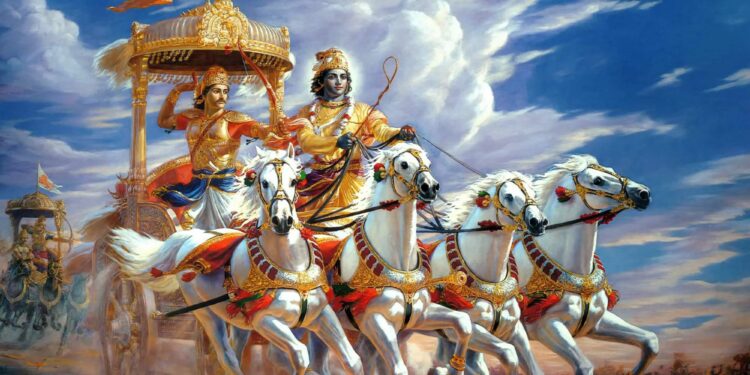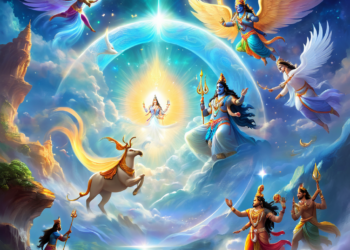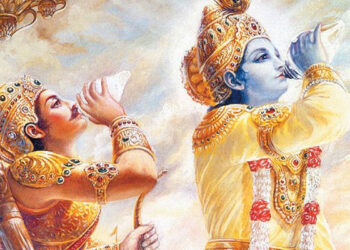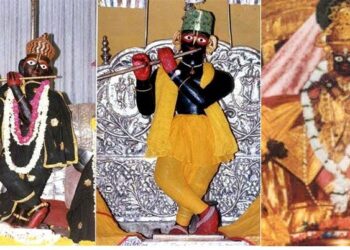TEXT 16
vaktum arhasy aśeṣeṇa
divyā hy ātma-vibhūtayaḥ
yābhir vibhūtibhir lokān
imāṁs tvaṁ vyāpya tiṣṭhasi
SYNONYMS
vaktum—to say; arhasi—You deserve; aśeṣeṇa—in detail; divyāḥ—divine; hi—certainly; ātma—Your own; vibhūtayaḥ—opulences; yābhiḥ—by which; vibhūtibhiḥ—opulences; lokān—all the planets; imān—these; tvam—You; vyāpya—pervading; tiṣṭhasi—remain.
TRANSLATION
Please tell me in detail of Your divine opulences by which You pervade all these worlds.
PURPORT
In this verse it appears that Arjuna is already satisfied with his understanding of the Supreme Personality of Godhead, Kṛṣṇa. By Kṛṣṇa’s grace, Arjuna has personal experience, intelligence and knowledge and whatever else a person may have, and through all these agencies he has understood Kṛṣṇa to be the Supreme Personality of Godhead. For him there is no doubt, yet he is asking Kṛṣṇa to explain His all-pervading nature. People in general and the impersonalists in particular concern themselves mainly with the all-pervading nature of the Supreme. So Arjuna is asking Kṛṣṇa how He exists in His all-pervading aspect through His different energies. One should know that this is being asked by Arjuna on behalf of the common people.
TEXT 17
kathaṁ vidyām ahaṁ yogiṁs
tvāṁ sadā paricintayan
keṣu keṣu ca bhāveṣu
cintyo ‘si bhagavan mayā
SYNONYMS
katham—how; vidyām aham—shall I know; yogin—O supreme mystic; tvām—You; sadā—always; paricintayan—thinking of; keṣu—in which; keṣu—in which; ca—also; bhāveṣu—natures; cintyaḥ asi—You are to be remembered; bhagavan—O Supreme; mayā—by me.
TRANSLATION
O Kṛṣṇa, O supreme mystic, how shall I constantly think of You, and how shall I know You? In what various forms are You to be remembered, O Supreme Personality of Godhead?
PURPORT
As it is stated in the previous chapter, the Supreme Personality of Godhead is covered by His yoga-māyā. Only surrendered souls and devotees can see Him. Now Arjuna is convinced that His friend, Kṛṣṇa, is the Supreme Godhead, but he wants to know the general process by which the all-pervading Lord can be understood by the common man. Common men, including the demons and atheists, cannot know Kṛṣṇa, because He is guarded by His yoga-māyā energy. Again, these questions are asked by Arjuna for their benefit. The superior devotee is concerned not only for his own understanding but for the understanding of all mankind. So Arjuna, out of his mercy, because he is a Vaiṣṇava, a devotee, is opening for the common man the understanding of the all-pervasiveness of the Supreme Lord. He addresses Kṛṣṇa specifically as yogin because Śrī Kṛṣṇa is the master of the yoga-māyā energy, by which He is covered and uncovered to the common man. The common man who has no love for Kṛṣṇa cannot always think of Kṛṣṇa; therefore he has to think materially. Arjuna is considering the mode of thinking of the materialistic persons of this world. The words keṣu keṣu ca bhāveṣu refer to material nature (the word bhāva means “physical things”). Because materialists cannot understand Kṛṣṇa spiritually, they are advised to concentrate the mind on physical things and try to see how Kṛṣṇa is manifested by physical representations.



















